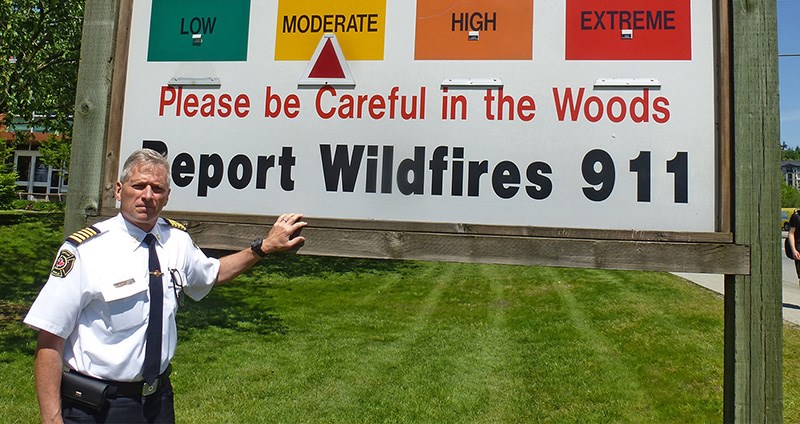Don't let a few sprinkles of rain fool you into taking risks with barbecues, cigarettes and even campfires, warns the head of Coquitlam Fire Rescue.
After a week of dry weather, the region's fire risk moved to moderate this week, prompting local firefighters to take stock of equipment, staff and training in anticipation of the upcoming summer fire season.
Coquitlam Fire Chief Wade Pierlot, who gets daily reports of the region's fire risk from Metro Vancouver — which monitors eight weather stations, including one north of the Coquitlam dam — is urging people to be extra careful in the coming weeks and months.
"We are trying to get the message out to people about the smoking materials. All the parks are non-smoking. Our parks also control what kind of cooking devices can be used," he said.
Concerns about a dry grass fire spreading to local parks and greenbelts is always at the back of his mind and, with graduation parties sometimes heating up in the local woods, Pierlot is also worried about campfires.
They aren't allowed but it's not unusual for a group to start a fire on a stretch of beach beside the Coquitlam River. And if that happens, "We'll show up and put the fires out, and the RCMP will show up, too."
Indeed, no risk is worth setting off a raging forest fire and with more people trekking in the woods, there is always a chance that fire could start with a careless act.
Fire risk is judged by how dry the forest floor is along with other measures such as temperature, relative humidity, wind and rain based on the Canadian Forest Fire Weather Information System. Coquitlam Fire also receives Coastal Fire Centre information on campfire bans and seasonal predictions.
Fire risk is posted on a sign outside each fire hall in the Tri-Cities and it can also be found on the city of Coquitlam website (coquitlam.ca) under Public Safety and Seasonal Safety.
Port Moody and Port Coquitlam are also gearing up for the summer, with PoMo firefighters hoping to get a campfire ban passed in their city and PoCo offering to let firefighters visit neighbourhood gatherings this summer to provide personal and fire safety information through the Hot Summer Nights Program (to book a visit, email [email protected]).
Meanwhile, Coquitlam Fire Rescue is extra vigilant as the summer weather returns and is asking residents to do the same. If you see something, don't hesitate to call the fire department, Pierlot said, noting, "No report is too small, early detection is key."
• The arsenal: In addition to forest fire and urban wild-land interface firefighting skills, Coquitlam Fire Rescue has a light attack vehicle on Burke Mountain for fighting fires along logging roads and a 3,000-gallon tanker truck capable of delivering water to remote areas. As well, 23 of its members are trained to provide exterior sprinkler protection to critical infrastructure or homes in the path of advancing fire plus two equipment units to allow one to respond to provincial requests for assistance.
• Prevention: Regular tree pruning is conducted in parks to remove potentially flammable materials and new homes are required to be built using non-combustible or fire-resistive materials. City bylaws also allow 900 identified homes to water their properties outside of Metro Water restrictions if they border onto parks or wild land areas considered vulnerable and the risk of fire is extreme.
SAFEY TIPS
The following safety tips are provided by Port Coquitlam Fire and Emergency Services:
• Never store combustible materials next to the barbecue.
• Before covering or storing your barbecue, make sure it has been shut off, is completely cool and/or has no hot coals.
• Never leave the barbecue unattended when in use.
• Keep gas hoses away from hot surfaces and hot grease.
• Keep children and pets away from the gas valve and the grill.
• Keep loose clothing away from the hot barbecue.
• Don’t put water on a grease fire — it will only cause flames to flare. Use an approved fire extinguisher or baking soda.
• Don’t operate your barbecue near wooden fences or walls, beneath a combustible roof, under a tree, near vinyl siding or in an enclosed space (such as a garage).
• When finished, first turn off the gas valve to allow gas in the hoses to burn off before turning off the burner controls.
• Clean the burners and grill regularly to minimize the risk of grease fires.
And to reduce the risk of fire damage to your property:
• Prune shrubs and trees, and remove deadfall or woodpiles near your home.
• Keep your grass mowed.
• Ensure your roof, gutters and eaves are free of combustible debris; prune overhanging branches.
• Make sure chimneys meet current building codes and have spark arrestors.
• Contact BC Hydro if vegetation is near or touching power lines.



